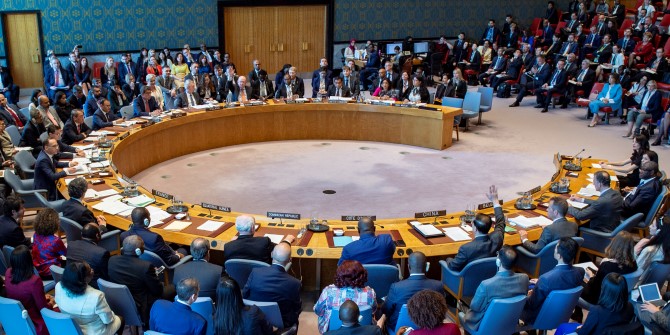Professor Christine Chinkin reflects on the power of grassroots initiatives and the potential for PSVI to contribute to transformative justice for survivors of sexual and gender-based violence against women.
‘The magnitude of conflict-related sexual violence against women in Colombia is yet to be fully understood. It is a crime that is massively underreported’ (AB Colombia, Colombia: Conflict-Related Sexual Violence and the Peace Process). What is known is that sexual violence was committed in systematic ways with varying patterns by all sides during the five-decade conflict, as recorded by the Centro Nacional Memoria Histoirca.
Although sexual violence as a crime against humanity has been excluded from the amnesty provision in the recently concluded Peace Accord between the Government of Colombia and FARC, attaining accountability and ending impunity for such crimes will be a difficult and complex process. Locating displaced victims, securing evidence and testimony are among the daunting investigative obstacles to justice with respect to the many crimes that were committed decades ago. The position is further complicated by the continuing and increasing crimes of gender-based and sexual violence being committed in the current, supposedly post-conflict, environment. It is of course well-established that ‘for most women in post-conflict environments, the violence does not stop with the official ceasefire or the signing of the peace agreement and often increases in the post-conflict setting’ (CEDAW Committee, General recommendation No. 30 on women in conflict prevention, conflict and post-conflict situations, 2013). Colombia is no exception. The figures are especially high with respect to 10-14 year old girls, indigenous women and displaced women. Women human rights defenders and journalists are also targeted with escalating rates of murder. Sexual violence is also associated with the extractive industries and illegal mining. As in other cases the ‘forms and sites’ of violence have shifted; violence is now associated with well-armed and organised criminal gangs who have moved into areas that have been vacated by FARC as demobilisation takes place but not been made safe by state military or police security forces. Indeed such forces are generally lacking. Another factor is that sexual and gender-based violence occurs in a continuum: it did not commence with the conflict and has not terminated with the Peace Agreement. Colombia is a patriarchal society where high levels of such violence have long existed (the age of sexual consent is 14 and one of the reasons for the high rate of participation by women in FARC is that they joined to escape violence at home or in the community). As well as seeking justice, ensuring security for women is essential, along with a cultural and attitudinal shift that recognises the importance of gender equality, women’s human rights and combating violence against women.
Against this reality, the Peace Accord with FARC has been hailed as the ‘gold standard’ for women’s participation and for making central the recognition of victims and their needs. The Peace Accord incorporates mechanisms for transitional justice, comprising three entities: the Truth Commission; the Special Jurisdiction for Peace; and the Commission for Missing Persons. It thus brings together concepts of the right to truth, restorative justice, criminal justice and the need to investigate disappearances. It is innovative in its integrated and comprehensive approach, but is also (and inevitably) top down. Once operative the various components face the challenge of reaching rural areas and becoming ‘owned’ by victims within their localities. Further, transitional justice mechanisms that focus on sexual and gender-based violence committed during the conflict are simply not adequate to address the continuum of violence experienced by and still facing women today.
These concerns highlight the importance of ‘bottom-up’ initiatives that supplement transitional justice processes and offer opportunities for real change in the lives of victims and survivors. One such programme in Colombia is that developed by the Women’s Network of Victims of Sexual Violence and which is supported by the UK Government through the Preventing Sexual Violence Initiative (PSVI). The Network operates through schools and within communities. It has widened its reach through alliances with universities and with private business. It provides support through giving voice and visibility to victims of sexual violence, especially at the local level and thereby contributes to national debate on the importance of combating sexual violence. During a visit to a school in Medellin in April 2017, Baroness Fiona Hodgson and I (as members of the PSVI Steering Board), met with girls and women survivors of sexual violence. We heard first-hand of how the empowerment achieved through speaking out had enabled them to move forward, for instance in transforming family relations or in returning to schooling many years after being forced to leave. Women from the Network spoke about how they had received the support to enable them to break their own silence (often after many years) and were then able to offer similar assistance to other victims, thus expanding the Network. Members also offer training in schools, working with both boys and girls through other media, for instance dance, art and story-telling. Story-telling in particular allows claims to be made through narratives where sexual violence is never made explicit but is understood by both narrator and the audience. By working in schools, members are able to assist young people who have experienced or witnessed such violence, whether in their homes, before, during or after the conflict and to help change attitudes and beliefs about gender relations, sex and social behaviour. Through the schools there is outreach to families and the community, creating a broader a base for cultural change.
Launched in 2012, PSVI has been widely praised for raising political awareness of sexual violence as an important component of international relations and agenda item within foreign ministries. PSVI and the Security Council’s Women, Peace and Security Agenda have highlighted that ending impunity and enhancing accountability for crimes of gender-based and sexual violence are essential ingredients of international peace and security. The International Protocol on the Documentation and Investigation of Sexual Violence in Conflict is a practical step to facilitate the collection and retention of evidence that can be effectively used in trials, even if conducted many years later. But there has also been criticism that PSVI, as with all top-down approaches, does not adequately communicate with victims, those women and men who are far removed from capital cities and from the reach of formal justice mechanisms. In contrast, bottom-up initiatives and projects can have exponential reach, way beyond the possibilities of state-based transitional justice mechanisms. This is not of course to decry the latter, only to emphasise the importance of long term, women and victim-centred projects that can operate alongside processes of transitional justice.
The Colombian Women’s Network is just one programme piloted by PSVI. There are many, often unheralded, similar initiatives in conflict-affected areas around the world. But such projects are not necessarily appreciated. In Colombia Network members spoke of the lack of understanding of the importance of addressing sexual violence, including from the Government that has accused women who speak out about their experiences as being from a military group. In the words of one member: ‘how is it possible the Government is not on your side and your word is put in doubt?’ By providing visible and sustainable support to such grassroots projects PSVI can in a small measure respond to such concerns and generate real change for the victims and within their societies. Such projects constitute good practice in transformative justice, which should be recognised and disseminated so that victims and survivors across conflict-affected areas can learn from and gain strength from each other. Giving visibility and legitimacy to such initiatives may be the most important and lasting outcome of PSVI.
The views, thoughts and opinions expressed in this blog post are those of the author(s) only, and do not reflect LSE’s or those of the LSE Centre for Women, Peace and Security.





